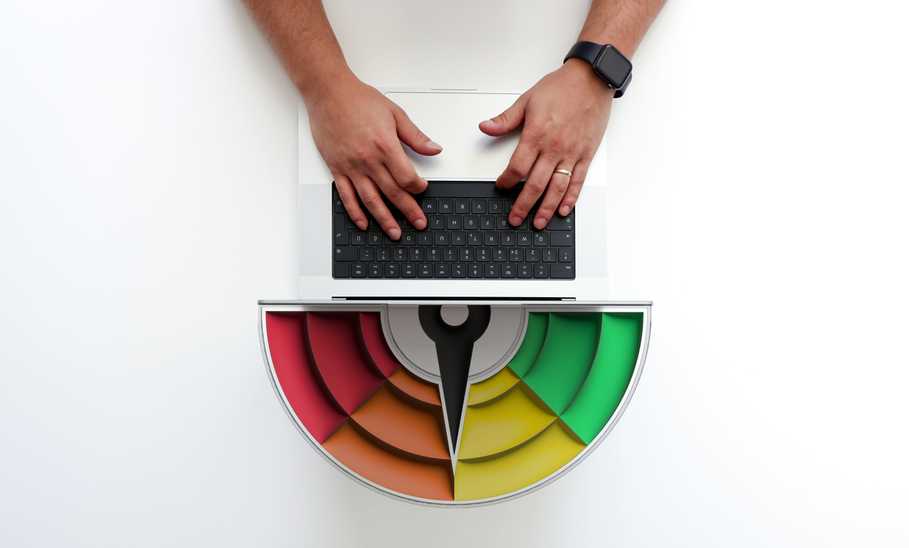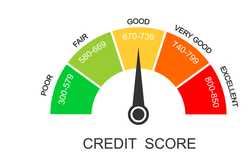650 Credit Score: Is it Good or Bad?


Our evaluations and opinions are not influenced by our advertising relationships, but we may earn a commission from our partners’ links. This content is created by TIME Stamped, under TIME’s direction and produced in accordance with TIME’s editorial guidelines and overseen by TIME’s editorial staff. Learn more about it.
Your credit score is one of the most important numbers in your financial life. It helps determine if you qualify for certain loans and credit cards, and what interest rates you’ll pay.
Currently, FICO scores range between 300 and 850. So, does a 650 credit score lean more toward the good side or the bad?
In this article, we'll break down how lenders view a 650 credit score and offer tips on how to improve it so that you can have less expensive lending options available in the future.
Credit scores that fall between 580 and 669 are considered to be fair. While this isn’t technically bad, there’s plenty of room for improvement.
With a 650 credit score, you’ll still have the ability to get a credit card. However, it’s not going to come with the bells and whistles you might get if you had excellent credit. You’ll be able to get most loan products, but lenders are going to view you as being a high-risk borrower. That means they’ll likely want to see a good income, strong employment, and positive payment history over the past couple of years. Even then, you’re likely to be offered higher interest rates on loan products than those with higher scores.
Most credit cards that offer attractive rewards and benefits are going to be unavailable to someone with a 650 credit score, but there are still cards available. Here are a few to consider. Each of the following will help you improve your credit score with good habits.
RELATED: Best Credit Cards
The Capital One Quicksilver Secured Cash Rewards card provides the best of both worlds for someone with a 650 credit score. Cardholders earn 1.5% cash back on all purchases. Plus—because it reports to all three major credit bureaus—you’ll have the opportunity to improve your credit score with good payment history.
After you’re approved for this no annual fee card, you’ll be required to make a minimum security deposit of at least $200. This will serve as your credit limit. However, with positive activities, you could have your credit limit raised after six months without any additional deposit.
The Capital One Platinum Mastercard® is an unsecured card, which means you won’t be required to have a security deposit, but it’s still geared toward someone with a 650 credit score. While it’s not going to have many perks, you’ll still have the chance to be considered for a higher credit limit after six months as long as you have a good payment history. This card also has no annual fee.
When you apply for the OpenSky® Secured Visa® credit card you’ll be able to do so without a credit check being performed. Similar to other secured credit cards you’ll need a refundable security deposit of between $200 and $3,000 which will act as your credit limit. Each month your payments will be reported to the three major credit bureaus, which means you’ll have the opportunity to build your credit score fast with on-time payments. This card comes with a $35 annual fee.

In addition to credit cards, you might be interested in other loan products. Here’s what you can expect with a 650 credit score.
If you’ve been thinking about getting a new car, you might have wondered if you can get an auto loan with a 650 credit score. Yes, it’s possible to get an auto loan, but you’ll most likely receive a higher interest rate on the loan compared to someone with a higher credit score.
As of July 2023, someone with a 650 credit score could receive a 60-month auto loan with an average interest rate of 12.30%. However, someone with a credit score of 700 would be able to get a loan with a rate of just 8.46%.
If you have a 650 credit score you’ll still have the ability to get a mortgage loan. Similar to an auto loan, you’ll likely be dealing with higher interest rates which means the home will cost you more.
With a credit score of 650, you’ll have a couple of different home loan options. According to Fannie Mae, anyone with a credit score over 620 is eligible for approval. However, there are a few restrictions. They’ll likely require your debt-to-income (DTI) ratio to be no more than 35%. You’ll also need to have a down payment of at least 25%. If you can raise your credit score to 660 before applying, the down payment requirements will be reduced to 5%.
The second home loan option available is an FHA loan. FHA loans are available to anyone with a credit score of at least 580, and a down payment of at least 3.5%. However, with an FHA loan, you’ll be required to have mortgage insurance, which could substantially increase your monthly payments.
If you’re planning on renting an apartment or house, the credit score you need will depend on the landlord. Most will likely require at least 600 to 650. Keep in mind that even though a higher credit score will give you access to lower interest rates when applying for a mortgage, the same won't be true if renting. Higher credit scores won’t typically give you a discount on your monthly rent.
While a 650 credit score might be good enough to rent an apartment, that might not be the case for leasing a car. According to Chase, it’s best to have a 700 credit score or better when leasing a car. While some might be willing to lease to someone with a lower credit score, it will likely require a larger security deposit and a higher monthly lease payment.
Your 650 credit score is going to have a large impact on your financial life. Because it’s considered to be a fair score and below the national average—718 in October 2023, according to FICO—you could be seen as a high-risk borrower. This means not all products are going to be available to you. Here are a couple of ways you could be impacted.
Most insurance companies use a credit-based system to assess the risk of drivers (unless you live in California, Hawaii, or Massachusetts where this has been banned). Credit-based systems look at your payment history and length of credit history to determine how likely you are to file an auto claim in the future. The more risk, the higher the insurance rates are going to be.
While you’ll have access to secured credit cards and some unsecured cards, most cards with attractive benefits like high signup bonuses and rewards will be out of reach until your credit score improves.
If you’re applying for a loan, lenders are likely to approve you, but it’ll almost always come with a higher interest rate in exchange for the additional risk they’re taking on.
If you want to gain access to new products and lower the interest rate you’ll receive on loans, you’ll need to work on improving your credit score. Here are a few of the best ways.
The first step to improving your 650 credit score is staying on top of what’s affecting your score. Signing up for a credit monitoring service like myFICO is going to be a big help. Not only will you have the opportunity to receive credit reports from each of the three major credit bureaus every month, but you’ll have access to your FICO score to monitor your progress.

The biggest factor in your credit score is your payment history. If you struggle to make your payments on time, this is going to be the most important thing to work on so that you can start improving your credit score.
One of the easiest ways to never miss a payment is to make things automatic. Most credit card companies will allow you to automatically make payments. You can choose to pay the minimum payment, your statement balance, or the total balance.
Looking beyond your credit cards, most other bills provide the ability to set up automatic payments. If not, you can always use a service like Cash App. Just set up each bill within your Cash App account, and it will automatically deduct the amount on the scheduled date and pay the bill for you.
If you’re constantly running up a high balance on your credit card, this is affecting your credit score. Credit utilization makes up 30% of your score. This is the amount of credit you’re using compared to your credit limit. Your goal should be to stay below 30%.
By using budgeting apps like Rocket Money or YNAB, you can stay on top of how much you’re spending each month. If you start approaching your budgeted amount in certain categories, you know it’s time to pull back for the remainder of the month.
By making sure you’re not spending more than you earn, you’ll start seeing your credit score improve.
If you only have a single credit account, consider opening another. As an example, maybe you have an auto loan, but you’ve always struggled to get a credit card. Or maybe you have a single credit card but nothing else. Part of your credit score is made up of your overall mix of credit accounts.
If you currently have high-interest credit card debt, you could take out a personal loan for bad credit through Upgrade. Personal loans typically have a much lower interest rate than credit cards so it would help save you money and provide you with an additional credit account.
While having a 650 credit score isn’t considered poor, it’s going to affect the products you’re able to receive and your interest rate, which means paying more on what you borrow. By working to improve your credit score, you’ll lower your rates which will help you save money over time.
Your credit score typically won’t affect the home loan amount you’re able to receive. Instead, it will affect the interest rate of the loan. The lender will determine how much you can borrow based on a number of factors like your income, debt-to-income ratio, and more.
Your credit score isn't going to impact the amount of car loan you qualify for. The lender will determine this amount by factoring in your income, your other debts, and more. The biggest impact your credit score will have is going to be on your interest rate.
The information presented here is created by TIME Stamped and overseen by TIME editorial staff. To learn more, see our About Us page.



